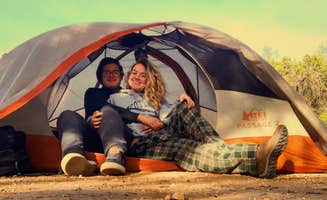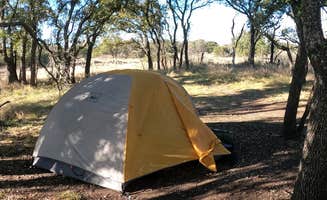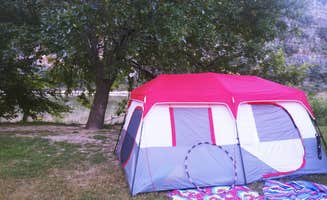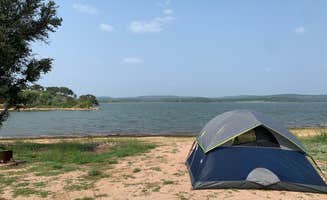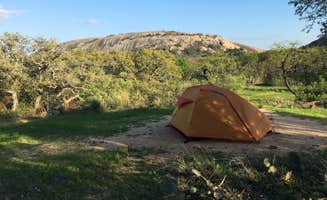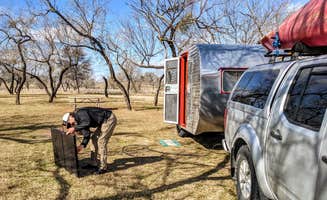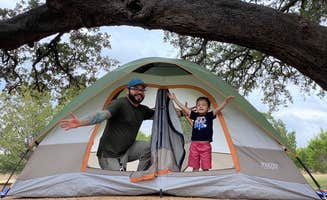Colorado Bend State Park contains several designated tent camping areas approximately 90 miles northwest of Austin. The park spans over 5,300 acres along the Colorado River with limestone formations and canyon lands typical of the Texas Hill Country. Weather ranges from humid 90°F summer days to cool 50°F winter nights, with spring and fall offering the most moderate conditions for backcountry camping.
What to do
Wildlife observation: The backcountry areas at Windmill Backpack Area provide encounters with diverse Texas wildlife. A camper reported, "We saw mountain lion prints every morning in the mud on the trail, which made me slightly anxious when hiking." Other visitors have documented sightings of armadillos, gray foxes, and wild hogs throughout the park's wilderness areas.
Swimming in natural springs: Spicewood Springs offers multiple swimming holes with cooler water temperatures than the main river. A visitor at the North Area noted, "Cold dip in Spicewood Springs topped off the trip." The Springs Trail crosses water multiple times, requiring hikers to get their feet wet while accessing these natural swimming spots.
Kayaking: The Colorado River access points provide opportunities for kayak exploration, especially from the River Backpack Area. "We stayed in the backcountry windmill area... There is a great loop you can do around the entire park if you want to backpack it all," explains one camper. The narrow river sections allow paddlers to explore coves and inlets not accessible by larger watercraft.
What campers like
Night sky viewing: Tent campers frequently mention the lack of light pollution. At Enchanted Rock State Natural Area, located approximately 75 miles from Bend, a visitor shared, "I never saw so many stars! Most beautiful thing I have ever seen!" The elevated granite formations provide excellent platforms for stargazing away from tree cover.
Wildlife encounters: Many tent campers enjoy the frequent wildlife visits. A camper at North Area — Colorado Bend State Park described their experience: "There were so many animals that came to visit us at night! Owls, armadillos, raccoons, a couple wild hogs, gray foxes, deer, even saw a mountain lion at one point after our campsite got raided by the raccoons."
Solitude: The more remote tent sites provide genuine seclusion. A camper at Windmill Backback Area observed, "Site was gorgeous and felt completely isolated. We could hear people occasionally at other campsites but other than that we did feel like we were alone." The backcountry areas require additional hiking effort but reward with privacy rarely found at drive-up campgrounds.
What you should know
Water access: Water availability varies significantly by season and location. At Cedar Point Recreation Area, a camper advised, "The water was a little low but if you plan on doing a lot of swimming, bring water shoes. There are a ton of little shells that cut you everywhere they touch." During summer months, water levels can drop substantially throughout the region.
Trail maintenance: Some trails may be overgrown or poorly marked, especially in less-traveled areas. A River Backpack Area visitor reported, "The trail along the way was not visible, the weeds had over grown the trail so our legs were getting cut up for such a short hike. Once we get there we found an 'alright' camp site near the river."
Reservations required: All tent camping within Colorado Bend State Park requires advance reservations through the Texas State Parks system. Primitive sites often book 3-4 weeks in advance during peak seasons (spring and fall), while group sites may require 3-4 month advance planning.
Tips for camping with families
Short hikes for children: Several trails accommodate younger hikers. One visitor shared about the North Area, "The hike on the awesome Spicewood Springs trail alone was worth the drive out to the park. My 3.5 year old kiddo was able to do the ~3 mile hike just fine with a little help."
Beginner-friendly campsites: Tejas Park offers an excellent introduction to tent camping without extreme isolation. A camper explained, "This location is close enough to be near civilization, but feels remote to get the primitive camping experience. The sites have a pad to set up your tent, along with fire rings and plenty of shade."
Wildlife education opportunities: The diverse animal sightings provide learning experiences for children. At Colorado Bend, families frequently document encounters with non-threatening wildlife like armadillos, which often approach campsites in the evenings and can be observed from a safe distance.
Tips from RVers
Limited hookups: Most camping areas near Bend cater primarily to tent campers with few RV amenities. At Shaffer Bend Recreation Area, an RV camper noted, "Small RV and tent-dry camping... Relaxing and clean. Very windy, so no bugs! Sites 1-13 closer together and more in site of each other but still ok."
Distance from supplies: Stock up before arriving as stores are scarce. A camper at North Area advised, "Long ways in and out of this park and from towns so make sure you bring all you need." The closest full-service grocery stores are located in Lampasas, approximately 30 miles from Colorado Bend State Park.
Solar considerations: Some campsites have heavy tree cover affecting solar panel function. A North Area visitor mentioned, "Sites were good sized and shaded which was a slight issue for our solar panel but there are other sites without shade." Campers requiring solar power should request less shaded sites when making reservations.


